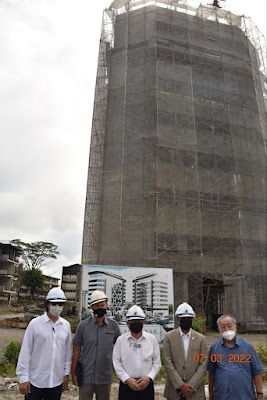By Simon Peter
KUCHING, March 11, 2022 - A well-known human rights activist expressed support for Sarawak to have control over the issuance of citizenship by the state government to stateless people born in Sarawak.
Picture: Human rights activist Peter John supports effort for Sarawak to have control over issuance of citizenship to genuine natives
Peter John said there are thousands of genuine natives in the remote rural areas who have remained stateless.
“This represents a clear failure of the federal authorities to understand the specific context of the state and its individual history and indigenous culture,” Peter said in a statement.
He noted that Minister of Women, Childhood and Community Wellbeing Datuk Sri Fatimah Abdullah has taken a step in urging Premier Datuk Patinggi Abang Johari Openg to take up the issue with Prime Minister Datuk Seri Ismail Sabri Yaakob for Sarawak to have control on the issuance of Malaysian citizenship.
He said Sarawak should have control over the issuance of citizenship now it has regained its original status as an equal partner to Malaya and Sabah in the federation of Malaysia.
Peter, who has been assisting many stateless persons in Sarawak to apply for the Malaysian citizenship certificates, said he believes that the stateless issue can be solved if the state government is granted the control.
Peter, a committee member of the Global Human Rights Federation, said many parents in remote areas are also illiterate and ignorant on the urgency and importance of registering the births of their children.
He said the parents only realise the importance of birth certificate when they want to register their children to study in government schools or when their children apply for jobs in towns.
Peter said, without these documents, the children may not be admitted to government schools and they are denied free health services from the government clinics and hospitals.
He said these children should be granted the citizenship on the basis of written testimonies of their village chiefs or community leaders, without the use of birthday certificates and identity cards, as this system is closer to their practice of customary law or Adat, which itself is law in Sarawak.
He added there should not be a problem as the village chiefs or community leaders know everybody in their community.
He said the National Registration Department (NRD) should not insist that all applications for birth certificates and identity cards must provide written documents as proof that they are born in Sarawak.
Speaking at the International Women’s Day on March 8, Fatimah urged for the state government to be granted control over the issuance of citizenship to stateless persons born in Sarawak, especially children.
She said this was important because it would enable the affected children to have the same rights as children with Malaysian citizenship status, especially in education.
She said since the setting up of the special committee on citizenship under Article 15A of the Federal Constitution, a total of 969 applications for citizenship have been received from 2016 to October 22, 2021.
She said only 253 applications have been approved as of today, while the remaining are still under consideration.
“What is most regrettable is that while waiting for the decision of the federal Home Affairs Ministry, these children are denied receiving or enjoying children’s rights, such as education, health, employment opportunities and receiving welfare aids,” Fatimah said.
She urged Abang Johari to bring up the issue with Prime Minister Datuk Seri Ismail Sabri Yaakob so that as an autonomous region, the state should be given a special power to solve the stateless issue by itself.









